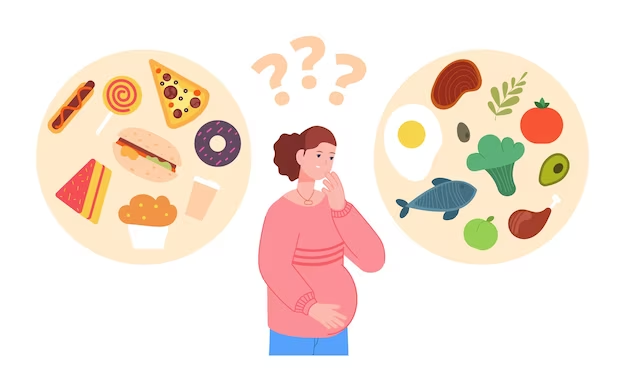-

The Risks of Junk Food During Pregnancy
As a physician specializing in women's health, I have encountered numerous cases where diet plays a crucial role in the health outcomes of pregnant women and their babies. One area of concern that frequently arises is the consumption of junk food during pregnancy and its potential impact on both maternal and fetal well-being. In this article, we will explore the risks associated with indulging in junk food during pregnancy and why maintaining a balanced diet is essential for a healthy pregnancy.
First and foremost, it's essential to understand what constitutes junk food. Junk food typically refers to highly processed, calorie-dense foods that are low in nutrients. Examples include fast food items like burgers, fries, pizza, sugary snacks, and carbonated beverages. While these foods may be convenient and satisfying, they lack the essential vitamins, minerals, and nutrients needed to support a healthy pregnancy. One of the primary concerns associated with consuming junk food during pregnancy is the increased risk of gestational diabetes. Junk foods are often high in refined carbohydrates, sugar, and unhealthy fats, which can lead to spikes in blood sugar levels. Over time, these fluctuations can impair the body's ability to regulate blood sugar, potentially resulting in gestational diabetes. This condition not only poses risks to the mother, such as preeclampsia and cesarean delivery but also increases the baby's risk of developing obesity and type 2 diabetes later in life.
Furthermore, a diet high in junk food can contribute to excessive weight gain during pregnancy, which is associated with various complications, including preterm birth, macrosomia (large birth weight), and birth defects. Excess weight gain can also make labor and delivery more challenging and increase the risk of complications during childbirth.
In addition to affecting maternal health, consuming junk food during pregnancy can also impact fetal development. A diet lacking in essential nutrients deprives the developing baby of the vital building blocks needed for growth and development. For example, inadequate intake of folate, found in leafy greens and legumes, increases the risk of neural tube defects such as spina bifida. Similarly, a deficiency in omega-3 fatty acids, found in fish and nuts, can impair brain development and cognitive function in the unborn child.
Moreover, the excessive intake of trans fats, commonly found in fried and processed foods, can negatively affect the baby's brain development and increase the risk of developmental delays and cognitive impairments.
In conclusion, the consumption of junk food during pregnancy poses significant risks to both maternal and fetal health. From increasing the risk of gestational diabetes and excessive weight gain to compromising fetal development and increasing the likelihood of birth defects, the consequences of indulging in unhealthy foods during pregnancy are profound.
As a doctor, I urge pregnant women to prioritize a balanced diet rich in fruits, vegetables, whole grains, lean proteins, and healthy fats to ensure a healthy pregnancy and optimal outcomes for both mother and baby. By making nutritious choices during pregnancy, women can set the foundation for a lifetime of health and well-being for themselves and their children
 6303940219
6303940219
 contact@drswethawomencare.com
contact@drswethawomencare.com
